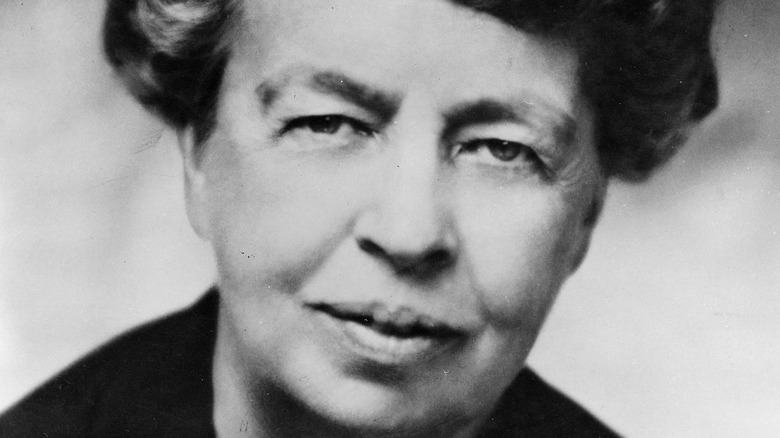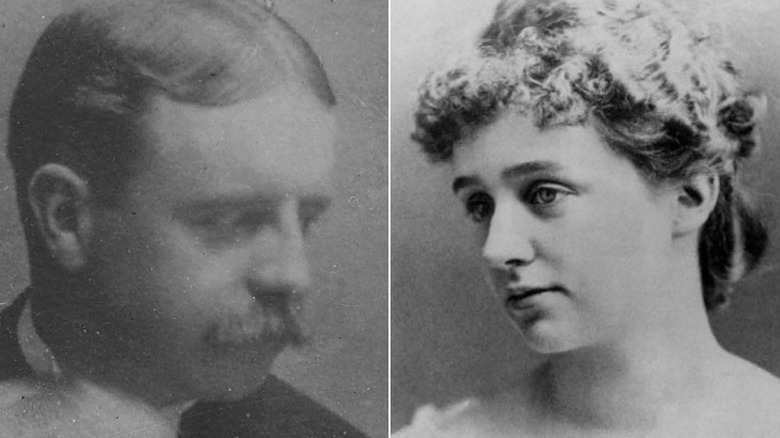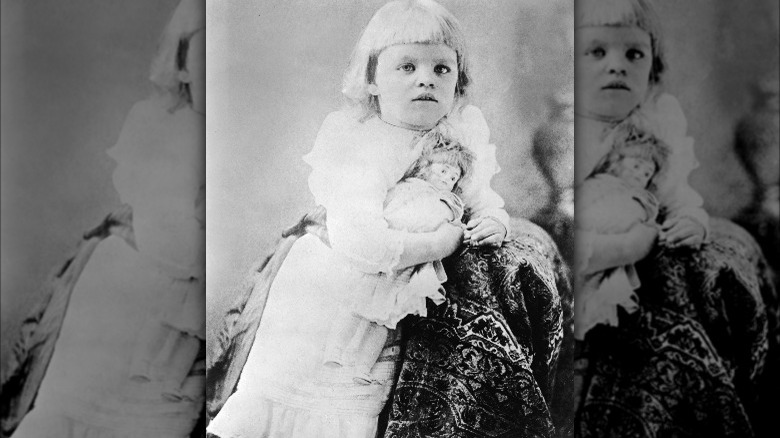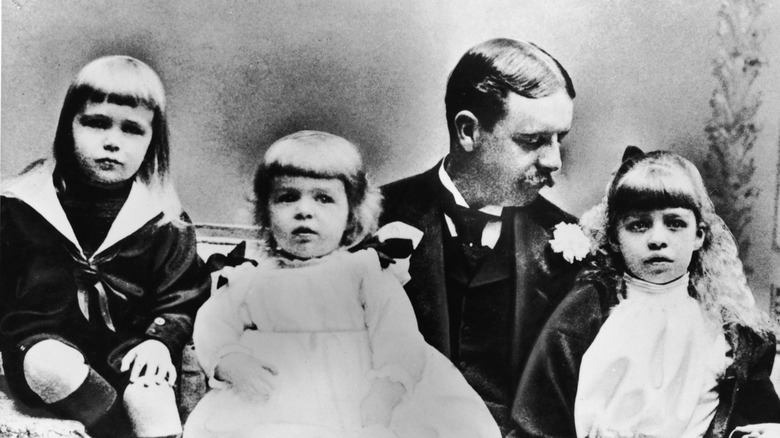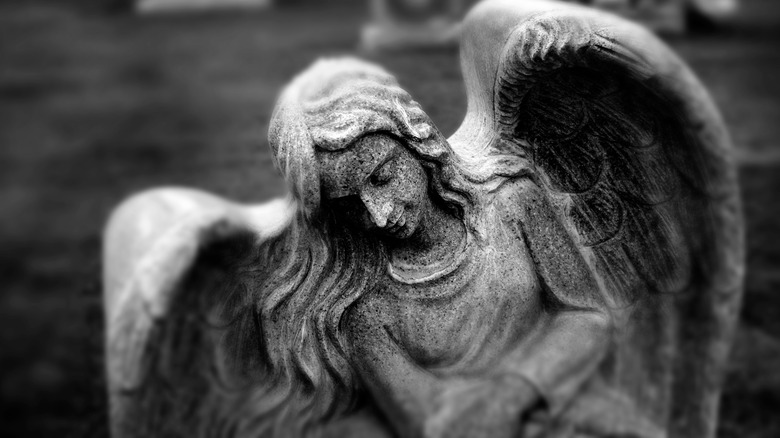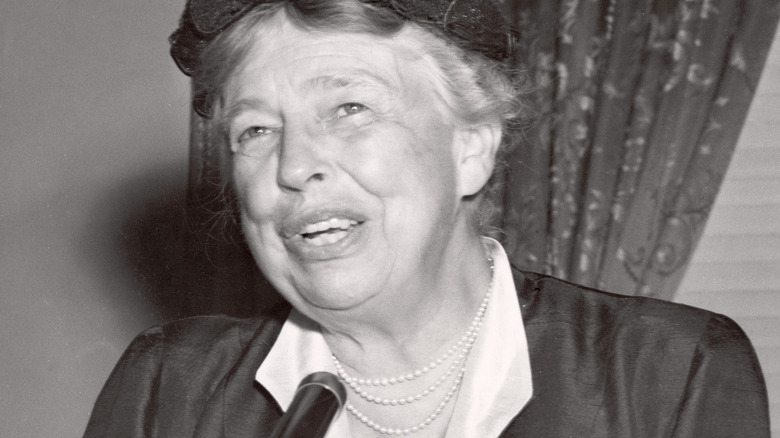The Devastating Truth About Eleanor Roosevelt's Parents
Eleanor Roosevelt, the longest-serving first lady who was also a U.S. representative to the United Nations, according to The White House. She is often considered one of the most influential women of the 20th century — and was named Time's Woman of the Year in 1948 — and was born into a hugely wealthy and influential family. But, money and power couldn't save her from a childhood filled with heartbreak and tragedy. She was born Anna Eleanor Roosevelt on October 11, 1884, to Anna Livingston Ludlow Hall and Elliott Roosevelt, in New York City, in what would appear from the outside as the most fortunate of circumstances, per the Franklin D. Roosevelt Presidential Library and Museum.
Her father was the younger brother of Theodore "Teddy" Roosevelt who would, in a few years after Eleanor's birth, begin his meteoric political rise to the U.S. presidency. Her mother's family stretched back to colonial America and the American Revolution through the Livingstons, who once owned huge swaths of New York's Hudson Valley, as The New York Times notes and played important roles in the American Revolution, according to the National Park Service.
They Were the Toast of Manhattan Before Things Fell Apart
After returning from a big-game hunting trip to India, Elliott met and married Anna in December 1883. The press described their wedding as one of the "most brilliant" social events of the season, according to the book "Franklin and Eleanor" by Hazel Rowley. But, soon it became clear that Elliott wasn't cut out for marriage or monogamy, or a steady job.
Elliott Roosevelt took a job working for his father-in-law's exclusive Manhattan real estate company but only lasted three years, per the National Park Service. He was more interested in spending his time drinking with friends at Manhattan's exclusive Knickerbocker Club or playing polo or fox hunting, according to the biography "Eleanor" by David Michaelis. Then in 1891, a maid from the family's Long Island estate gave birth to Elliott's child and wanted $10,000 –the equivalent of more than $300,000 today — to keep quiet about it, according to Rowley's book.
Eleanor Roosevelt's Mother Taunted Her
Eleanor Roosevelt's mother, Anna, was popular, athletic, and deemed beautiful by the conventional standards of the day, but many people considered her vain and shallow, according to the National First Ladies' Library. Eleanor apparently didn't rise to her mother's beauty standards. She nicknamed her child "Granny" because of what she considered her plain looks and awkwardness and would sometimes taunt Eleanor in front of others, according to the biography "Eleanor." Her mother's behavior towards her made Eleanor feel isolated and ashamed, per VQR.
In November 1892, Anna Roosevelt contracted diphtheria, a bacterial infection, and a month later died at the age of 29, per "Franklin and Eleanor." Eleanor was only eight years old. At the time of Anna Roosevelt's death, she and her husband were estranged, and Elliott was not present when she died. The death of her mother pushed Eleanor even closer to her father, but soon even that lifeline would be severed.
The Tragic End of Elliott Roosevelt
Eleanor's father, Elliott Roosevelt, was handsome, dashing, and beloved by his daughter. He also couldn't hold down a job, was an alcoholic, and later became addicted to morphine after breaking his leg, according to the National Park Service. Even so, Eleanor was dedicated to him. "Everything I did with my father remains in my memory today, a vivid moment not to be forgotten," she would later write in her 1960 book, "You Learn by Living."
There are some differences of opinion as to how Elliott died with some sources alleging he attempted to take his own life by jumping out of a parlor window of his mistress's house in the summer of 1894 before having a seizure, a medical issue he'd had since childhood, per the book "Eleanor Roosevelt: Transformative First Lady," by Maureen Hoffman Beasley. Other sources say he died of a heart attack related to alcoholism — the cause listed on his death certificate, according to Vita Brevis. Either way, at the time of the 34-year-old's death, on August 14, 1894, Eleanor hadn't yet turned 10, and losing her father devastated her.
If you or anyone you know is struggling with addiction issues, help is available. Visit the Substance Abuse and Mental Health Services Administration website or contact SAMHSA's National Helpline at 1-800-662-HELP (4357).
Another Death
At Anna Roosevelt's insistence just before her death — and before Elliott Roosevelt had died — Eleanor and her two younger brothers went to live with Anna's mother, Mary Livingston Ludlow Hall, per the National Park Service. Eleanor's grandmother was a stern woman who was severe toward the children, according to VQR.
Just a year after Anna Roosevelt died, tragedy struck again when Eleanor's brother, Elliott Jr., who they called "Ellie," contracted scarlet fever, a bacterial infection that had no known cure at the time, and also died. He was just four years old. Before their father's death, Mary did her best to keep him from seeing his children and didn't allow Eleanor to attend his funeral, per "Franklin and Eleanor." Eleanor continued to feel isolated and shy but soon a new opportunity would help her blossom, giving her confidence and the freedom she lacked under her tyrannical grandmother.
Eleanor Roosevelt Rises Above Her Family Tragedies
When Eleanor Roosevelt turned 15, her grandmother sent her to a boarding school outside of London for three years. Eleanor flourished at Allenswood Girl's Academy, in Wimbledon, under the wing of Marie Souvestre, who ran the school and had progressive views that would greatly influence Eleanor's later activism, according to the National First Ladies' Library. A year after her return to the United States, Eleanor married her fifth cousin, Franklin D. Roosevelt. As both first lady and after her husband's death in 1945, she would tirelessly advocate for various social causes, from women's suffrage to Civil Rights and issues around poverty, according to the Franklin D. Roosevelt Presidential Library and Museum.
Throughout her life, Eleanor Roosevelt continued to feel a special bond with her father and overlooked his many demons. "He dominated my life as long as he lived, and was the love of my life for many years after he died," she recalled in her 1961 "The Autobiography of Eleanor Roosevelt." Of her parents' relationship, she said in the same book, it was as if "tragedy and happiness came walking on each other's heels."
